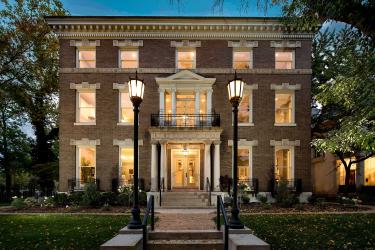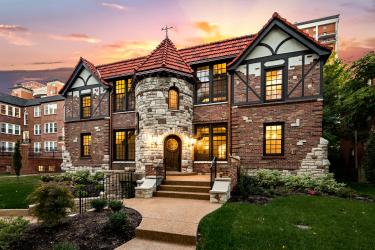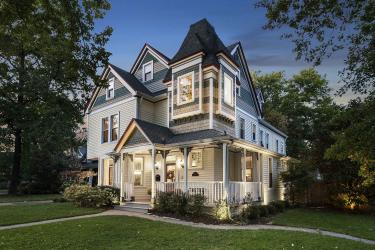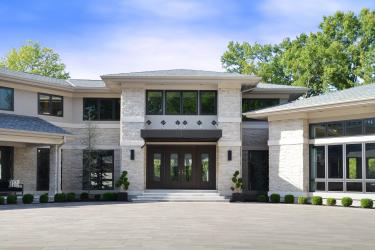CITY OF ST. LOUIS, MO
Benton Park. Designated as a sustainable neighborhood in 2004, Benton Park was added to the National Register of Historic Places in 2005. Most homes date back to the late 19th century, many with the original moldings, stained glass and fixtures intact. Century-old trees shade streets, and residents tend to maintain meticulous porches, lawns and gardens.
Central West End. The Central West End is right across from Forest Park, caddy-corner to Washington University and five minutes from downtown. However, most residents find few reasons to leave the neighborhood. The business district’s cobblestone streets are dense with restaurants, stores and galleries. Not far from the Central West End’s business district you will find gated streets lined with turn-of-the-century mansions and larger historic homes. The area also includes high-rise apartments, condominiums and luxury apartments.
Compton Heights. Located on the near Southside of the City of St. Louis in the shadow of the water tower Reservoir Park, Compton Heights is one of the earliest planned residential developments. Established in 1889, the vibrant neighborhood has wide setbacks, curving streets, remarkable vistas and more than 200 homes. A historic district, Compton Heights provides residents with the ambiance of Victorian living.
Dogtown. Just south of Forest Park and the Saint Louis Zoo is a neighborhood affectionately known as “Dogtown.” This lively, tree-lined neighborhood consists of smaller, older homes, apartments and local restaurants and bars; it also boasts a front-row view of the St. Patrick’s Day parade route during the city’s popular Irish celebration.
The Hill. Settled in the late 19th century by immigrants from northern Italy and Sicily, this well-established neighborhood embraces its heritage. The Hill prides itself on meticulously maintained homes, locally renowned Italian-American restaurants, bakeries, delis and specialty grocers.
Holly Hills. Established in the 1920s, Holly Hills is a charming neighborhood located in South St. Louis near the intersection of I-55 and Loughborough Avenue. Both single-family and multi-family homes, from brick mansions to bungalows, anchor the tree-lined streets. The neighborhood has excellent schools, churches and the third largest park in the city of St. Louis, Carondelet Park.
Lafayette Square. Named after a Revolutionary War hero, Lafayette Square is all about history, from streets lined with Victorian “painted ladies” to 30-acre Lafayette Park, not only the oldest park in the city, but also the first park west of the Mississippi River. Located southwest of downtown, Lafayette Square has a fine collection of bars and restaurants, including SqWires Restaurant and Market, Bailey’s Chocolate Bar and Square One Brewery. In addition to Victorian mansions, you will find luxury apartments, lofts and condominiums.
Downtown St. Louis. Thanks to an urban renewal project, downtown St. Louis is one of the hottest housing tickets in the city. Lofts and apartments range from small rental units to lavish penthouses. Downtown has access to dry cleaning services, hardware and grocery stores, as well as a large selection of fine and casual dining spots. Within walking distance of the lofts and condominiums are famous sports and entertainment venues, as well as historical landmarks.
St. Louis Hills. Constructed between 1930 and 1960, most of the homes in St. Louis Hills are brick, but their architectural styles include gingerbread bungalows, larger ranch houses and an eight-sided Art Deco house. Like many St. Louis City neighborhoods, the community is centered around green space — in this case, 60-acre Francis Park, which hosts a weekly outdoor concert series during the summer months.
Shaw Neighborhood. Bordering the west side of this historic neighborhood is the Missouri Botanical Garden, planned and installed by Henry Shaw. Shaw Neighborhood received its historic designation in 1985 and boasts beautiful, grand homes from the turn of the century and spacious multi-family dwellings within walking distance of the Garden and Tower Grove Park. Today, the neighborhood is filled with bistros, coffee houses, florists and art galleries.
Skinker-DeBaliviere. Beautiful, tree-lined streets and historic homes characterize the Skinker-DeBaliviere neighborhood. Its development began during the 1904 World’s Fair. Within walking distance of Forest Park, Washington University and the Delmar “Loop," the area was designated a Local Historic District in 1978. The large single-family homes and expansive apartment buildings, ranging in style from Classic to Tudor Revival to bungalow-style, boast exquisite early 20th-century architectural details in their art glass, millwork and fireplace mantels.
Soulard. One of the oldest communities in the city, Soulard is filled with renovated brick rowhouses and breathtaking Victorian-style homes, bars, pubs, restaurants and businesses — many of which are centuries old. Named after Antoine Soulard, the first developer in the neighborhood, the two-block area of land known as Soulard Farmer’s Market was donated by Julia Soulard in 1838 with the stipulation that it remain a public market. Today, the market still remains open all year.
Tower Grove. This area actually includes two neighborhoods – Tower Grove South and Tower Grove East. They both surround Tower Grove Park and the Missouri Botanical Garden. Homes in this area range from impressive mansions to quirky, turn-of-the-century flats with pocket doors and fireplaces. Both neighborhoods are demographically mixed, housing residents in historic homes to graduate students. Also of note is South Grand Boulevard, an up-and-coming stretch of ethnic restaurants, hip bars and shops.
North County
Florissant. Florissant dates back to the fur-trading colonies that established themselves here in 1767, and elegant 18th- and 19th-century homes still grace many of the residential streets. Careful to preserve its historic heritage, this North County suburb prides itself on a progressive attitude and continues to develop new residential and business areas. Home buying options include single-family homes, historic homes and new home developments.
Hazelwood. Home to more than 1,000 businesses, including Fortune 500 companies and numerous corporate headquarters, the City of Hazelwood is conveniently located near Lambert-St. Louis International Airport and other major transportation routes, which makes it an ideal place to start a business. In addition to its dynamic business community, Hazelwood has a fully accredited public school district, vibrant neighborhoods, a variety of home options and nearby shopping venues, such as the St. Louis Outlet Mall.
South County
Crestwood. Crestwood is a great community for raising a family and conducting business. Located in the southwestern portion of St. Louis County and just east of I-270 and I-44, the airport and downtown St. Louis are easily accessible in less than 30 minutes. Crestwood offers a large selection of single-family houses, which have consistently proven to maintain and increase their values as they age.
Shrewsbury. What used to be a 278-acre farm owned by General John Murdoch is now a municipality full of homes, condominiums, apartments, shopping areas and a wonderfully renovated City Center. Conveniently located along I-44, downtown is just minutes away, which is convenient for all St. Louis sporting events and entertainment destinations.
Sunset Hills. Located on a Mississippi flyway, Sunset Hills is a relatively young city incorporated in 1953. Bordered on the west by the Meramec River, the city has more than 70 acres of parkland. Sunset Hills, known to be a safe, family-friendly area, also offers a country club, private prep school and superior city services. Homes range from brick ranch homes to luxury developments.
Webster Groves. Classic homes and oak-lined streets give Webster Groves a timeless feel, and its proximity to Webster University means that professors, students and other forward-thinkers keep the city young and progressive.
Many of the area’s historic homes have been well cared for throughout the years and range from single-family dwellings to large extravagant houses.
Mid County
Brentwood. Known as the “City of Warmth,” Brentwood provides the advantages of a small town atmosphere in addition to close proximity to the city. Brentwood offers a diverse retail shopping area, specialty shops, the annual Brentwood Days Festival and Charity Golf Tournament, and its own Historical Society.
Clayton. As the county seat, Clayton is a natural magnet for commerce and culture. The central business district is home to Fortune 500 companies, as well as upscale restaurants, wine shops, galleries, boutiques and specialty shops. Clayton’s residential areas range from stately brick homes on tree-lined streets to high-rise condominiums. This area also offers upscale, renovated homes, luxury apartments, and new developments built to blend in with older, historic structures. Clayton’s school district is one of the finest in the St. Louis area, and residents have easy access to the MetroLink, Lambert-St. Louis International Airport and downtown.
Frontenac. This small suburb of St. Louis has not deviated far from its historical French roots. The land of Mr. and Mrs. Benjamin Wood was sold and divided into what became several subdivisions of Frontenac, yet the city has maintained its predominantly 1-acre lots. This area is part of two school districts — Ladue and Kirkwood — and has churches, synagogues and businesses. Frontenac continues to be the area’s upscale retail destination with Plaza Frontenac’s benchmark shops, Neiman Marcus and Saks Fifth Avenue.
Huntleigh. Situated between Geyer Road and Lindbergh Boulevard, Huntleigh is a small St. Louis suburban niche — dotted with rolling hills and sprawling homes — made up of approximately 334 residences that are within close proximity to Frontenac and Town & Country.
Ladue. One of the nation's most affluent suburbs, Ladue prides itself on its excellent community services and tranquil, private neighborhoods. Traditional colonial and Tudor-style mansions surrounded by generous lots are the norm, with several new luxury homes added each year. Nearby, there are three exclusive country clubs, several private schools, upscale boutiques and a variety of galleries, antique shops, specialty stores and spas.
Maplewood. In a matter of just a few years, Maplewood has transformed itself from an empty, outer-ring suburb to a vibrant neighborhood, attracting young families from all over the region. Maplewood’s section of Manchester Road is a street lined with four-star restaurants and unique boutiques and businesses. Homes tend to be traditional St. Louis-style brick units, though due to Maplewood’s increasing popularity, a great deal of rental housing is being converted to answer the demand for owner-occupied homes.
Olivette. More than 80 acres of beautiful parkland grace this small St. Louis County community, just west of University City and downtown. Nestled along Olive Boulevard, its locale offers easy access to surrounding St. Louis attractions. A wide array of youth and adult activities makes Olivette a well-established family community.
Richmond Heights. This St. Louis municipality is melding “progress with tradition,” and in doing so, it offers an array of attractive homes in desirable neighborhoods, public and private schools, and a variety of city services. Located at the intersection of I-64/40 and Hwy 170, Richmond Heights is part of four public school districts, has two private schools and is within close proximity to seven advanced education institutions.
Rock Hill. Situated west of downtown, Rock Hill is a small community within the Webster Groves School District. Its closeness to Manchester Road and Webster Groves allows easy access to several shopping, business and dining districts, as well as its own arts and entertainment, and home and garden businesses.
University City. Although not located in the city, this suburb definitely has an urban vibe. Delmar Boulevard, passing through the heart of "U. City," is rarely devoid of foot traffic for good reason; this stretch, known as "The Loop," offers boutiques, independent book and music stores, coffee shops, ethnic restaurants and gourmet food stores. Grand older homes, multiple-family apartments, condominiums and single-family ranch homes are just a few of the housing options.
Warson Woods. Established in 1936 and situated between Ladue and Glendale, Warson Woods is divided into four unique wards — a feature that makes the township so diverse. A wonderful business district, restaurants, parks, notable schools, including Webster Groves and Kirkwood school districts, and local shopping venues make Warson Woods a close-knit community.
West County
Ballwin. This municipality is a thriving suburb because of its proximity to Manchester Road. Ballwin residents enjoy access to a wide array of restaurants and shops. The area’s housing options include high-end, single-family homes developed over the last 30 years, as well as a supply of luxury condominiums and apartments.
Chesterfield. Chesterfield offers quick and easy access to its many restaurants, top-rated schools, churches, shopping malls, retail districts and fitness facilities. Chesterfield’s varied housing options include established homes, luxury condominiums, townhomes, new construction and single-family homes — some of them mansion-like in stature.
Clarkson Valley. Clarkson Valley comprises more than a dozen subdivisions, including Forest Hills, which boasts a country club that features a championship golf course. In addition, the city’s schools include top-ranked Crestview Middle School and Marquette High School.
Creve Coeur. Creve Coeur is home to many of the St. Louis area’s largest information technology firms. The surrounding area to Creve Coeur’s business corridor on Olive Boulevard offers restaurants and shops, with nearby parks, a municipal golf course and an ice arena. This city’s upscale residential neighborhoods tend to be tucked away from the busy hum of Olive Boulevard, and home options include luxury mid-rise condominiums, smaller ranch homes and sprawling residences surrounded by wooded lots. Its mid-county location also offers quick access to highways, Lambert-St. Louis International Airport and downtown.
Des Peres. Des Peres is a city that is growing quickly. West County Center contains St. Louis’ first Nordstrom store, as well as a variety of fine dining options. The city also has The Lodge Des Peres, a kid-friendly, municipal fitness facility with an indoor-outdoor aquatic center, fitness area, basketball and volleyball courts, meeting rooms and classrooms.
Ellisville. Ellisville boasts an acre of parkland for approximately every 40 residents. Eleven parks weave through a well-balanced mix of beautifully maintained residential neighborhoods and business developments. Easily accessible by I-40/64, I-44 and I-270, Ellisville is just 13 miles from the western city limits of St. Louis and a little more than 30 minutes from the airport.
Eureka. Located along I-44 at the southwestern end of St. Louis County and in the award-winning Rockwood School District, Eureka is within easy driving distance to several two-year and four-year colleges and universities, as well as many technical schools. Spacious homes on wooded lots are hallmarks of the city’s residences. Local restaurants and a variety of shopping venues add to Eureka’s charming small-town atmosphere.
Fenton. Located along the Meramec River, this "City of Parks" has more than 340 acres of parkland, which offers a wide variety of activities. The Fenton Parks and Recreation Department staff offer programs for children age three through senior citizens, and the RiverChase of Fenton, the city’s recreation facility, offers indoor and outdoor pools, a competition pool, basketball courts, a fitness area, a dance studio and much more.
Kirkwood. Kirkwood was developed in 1853 as a railroad-commuting suburb, and the train station is still the center of the city’s charming downtown. The pedestrian-friendly business district retains its historic look, with commercial space mostly occupied by smaller businesses and local restaurants. A farmers market, pocket parks and specialty shops add to the city’s small-town atmosphere. If you’re searching for historic homes with character, Kirkwood is a great place to look. Those who prefer newer quarters might check out Station Plaza, which is modeled after European city living.
Manchester. The community of Manchester is more than 200 years old and is composed of seven parks, the Manchester Aquatic Center, great schools in the notable districts of Parkway and Rockwood, and quality municipal services. It has a small-town atmosphere, yet residents have the advantage of easy access to the entire St. Louis Metropolitan area.
Maryland Heights. Maryland Heights is the seventh largest municipality in St. Louis County and home to the Hollywood Casino Amphitheatre, Westport Plaza, Creve Coeur Park, Harrah’s Casino and Aquaport. With more than 1,600 businesses, Maryland Heights is becoming a regional hospitality and entertainment destination, complete with dining and recreational opportunities. In the past 26 years, Maryland Heights has also developed a variety of housing styles – more than 60 percent of people living in this area own their homes.
Town & Country and Country Life Acres. Once primarily woodland and farmland, Town & Country is a prestigious suburban community. It’s the perfect municipality to maintain a suburban lifestyle while enjoying the convenience of a short drive on I-64/40 to the city. This community prides itself on its quiet, restful green residential areas with few commercial developments and excellent educational options.
Wildwood. Wildwood offers residents a blend of country and county living, with easy access to both state parks and the greater metro area. Residential development includes luxury homes and large traditional subdivisions surrounded by plenty of green space. Educational options include the highly rated Rockwood School District and excellent private and parochial schools.
St. Charles County
Lake St. Louis. Built on the edge of two man-made lakes, Lake St. Louis offers plenty of recreational opportunities, making it a popular settling place for both retirees and young families. In addition to water sports, Lake St. Louis offers riding stables, hiking trails, ball fields, an 18-hole championship golf course and Missouri's only Von Maur department store. One of the top 10 "Best Places to Live: Money magazine's 2009 list of America's best small cities," Lake St. Louis boasts homes that accommodate a large spectrum of lifestyles and budgets. Homes range from small, efficient condominiums to luxury homes on the edge of the lake.
O'Fallon. Named 26th in Money magazine's 2010 "Best Places to Live: Money's list of America's best small cities," O’Fallon is the fastest-growing suburb of St. Charles. Housing and business developers have been hard at work keeping up with the city’s population boom. Because of the growing local population, large retailers have been eager to invest in the community. Shopping, dining and entertainment options are plentiful and family-friendly. O’Fallon is also home base for the minor league baseball team the River City Rascals. Homes tend to be affordable, single-family units situated in well-maintained neighborhoods.
St. Charles. As the former state capitol and launch point for the Lewis and Clark Expedition, St. Charles is steeped in history and charm. Founded in 1765, the city’s downtown is paved with cobblestones and has retained its traditional look and feel. Main Street offers fine dining, antique shops, boutiques and museums. Despite its reverence for its heritage, the city is forward-thinking, with many prosperous companies headquartered there. As a result, St. Charles’ housing options include older, historic homes, as well as newly constructed developments.
St. Peters. Located west of St. Charles, St. Peters was founded by French traders in the late 1700s. St. Peters has grown from a small farming area of 486 people in 1970 to a large suburban community, home to more than 60,000 people and 2,500 businesses. This growing city has been recognized nationally, such as on Money magazine's "Best Places to Live: Money's list of America's best small cities."
Wentzville. Founded in 1855, Wentzville was named for Erasmus Livingston Wentz, the chief engineer of St. Louis, Kansas City and the Northern Railway. Contemporary, rustic ranch homes and farm sites are all available at affordable prices, along with newer two-story homes. Conveniently located on I-70 west of St. Louis, Wentzville combines a rural lifestyle with convenient living, as it offers easy access to the commercial, educational and recreational amenities of St. Louis.
WingHaven. Located just west of the Missouri River off of I-64/40, residents of WingHaven enjoy quick access to Chesterfield and a 30-minute drive to downtown, but they have the advantage of enjoying all that WingHaven has to offer: jogging trails, a movie theatre, swimming, golf, spa, library, shops and fine dining.
Franklin County
Franklin County comprises quaint, historic towns such as Gerald, Labadie, New Haven, Pacific, St. Albans, St. Clair, Washington, Union and Sullivan, and it is home to many sites along Route 66, state parks, wineries and historical districts. Missouri riverfront trails and parks, charming bed and breakfasts, shops, museums and galleries add to this area’s small-town charm, but its easy access to the major metro area offers all the excitement of the city.
St. Albans. The St. Albans community boasts 13 neighborhoods along the beautiful Missouri River. As Missouri’s premier golf community, St. Alban’s has two championship golf courses, a luxurious country club and a variety of low-maintenance villas and elegant million-dollar estates.
MADISON COUNTY, IL
Alton. Residents and visitors of Alton enjoy breathtaking scenery along the Mississippi River by traveling down the Great River Road by car, bicycle or on foot. With 15 parks and several attractions — such as the Clark Bridge, Alton Marina and Fast Eddie's Bon Air — Alton is a wonderful place to raise a family, work and enjoy life.
Bethalto. Surrounded by rolling hills and picturesque farms, Bethalto is one of the fastest-growing communities in Madison County. Home to the St. Louis Regional Airport, an extensive public library, a senior citizens center and several parks, this village offers a relaxed lifestyle perfect for families. Its close proximity to downtown allows residents to enjoy the cultural and entertainment opportunities of the nearby city.
Edwardsville. The third oldest city in Illinois, charming Edwardsville boasts a picturesque Main Street, thriving commercial district, Children’s Museum and golf courses. Southern Illinois University Edwardsville (SIUE) is a vibrant, growing university and an excellent option for higher education.
Glen Carbon. Residents of Glen Carbon can enjoy the Glen Carbon Heritage Trails complete with restored prairie areas and access to the nearby communities of Troy, Edwardsville, Maryville and the SIUE campus. The Village of Glen Carbon also offers sports leagues, several parks, a conservation area and more than 10 churches, and it is part of the Edwardsville School District.
Godfrey. As one of Illinois’ newest municipalities, the Village of Godfrey is expecting continued residential and commercial growth. Although much of Godfrey has been primarily residential and remains devoted to agriculture, this large community offers a golf course, movie theatre, the Alton Symphony and Youth Symphony, and several schools and churches.
MONROE COUNTY, IL
Columbia. Located on the Mississippi River bluffs, Columbia’s beautiful scenery adds to its small-town charm, but its residents have the advantage of easy accessibility to St. Louis just 12 miles away. Columbia residents also enjoy a wide variety of restaurants, three golf courses and a rich German heritage. Columbia is one of the fastest-growing suburbs in the Greater St. Louis area.
ST. CLAIR COUNTY, IL
Belleville. Situated near several major highways, such as I-255 and I-64, Belleville is a convenient and comfortable city for business. It is also a wonderful community in which to raise a family with its commitment to excellent education, elementary to higher education, in addition to attractive, safe neighborhoods. Belleville’s wide array of shops, cultural opportunities — including historical and philharmonic societies — and local shopping add to the charm of this growing city.
O’Fallon. Known as one of the fastest-growing communities in the St. Louis Metropolitan area, O’Fallon, Illinois, has a rich history of trade and industry, which has laid the foundation for its continued growth and prosperity. Hardworking residents, including personnel from nearby Scott Air Force Base, make up the diverse community of this charming small town just across the Mississippi River from downtown.











